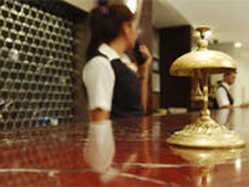Survey reveals long-term impact of discounting on hotel brands

The reasons why many hotels have become reliant on discounts and special offers are clear: A survey of European hotel owners released today by Hotwire.com reveals that nearly a third of travellers would never buy a hotel room that hasn’t been discounted.
Discounts, special offers and (as reported by BigHospitality yesterday) online travel agencies have become necessary methods for hoteliers to fill rooms. But the popularity of these schemes, particularly in the mid-market, has raised concerns that they can have a negative impact on a brand.
Michelle Rosinsky, senior manager at Hotwire.com, said: “In this environment, discounting is a necessity for hoteliers, but as most of them now realise, they need to be careful how it’s done, because there are some inherent risks. It’s about choosing the right way at the right time for the right type of customer.
“Hoteliers are concerned that if their brand is seen as ‘always on sale’, it will be devalued and end up going the way of other companies and industries where consumers are never prepared to pay a premium.
“We’re not expecting that hoteliers will suddenly give up on discounting, because it is still an effective way to increase occupancy. However, we believe they’ll become more selective about the channels they use, the value of discounts and the timing of their offers.
“Discounting will become more last-minute and increasingly they will utilise opaque sites and mobile.”
Secret hotels
‘Opaque’, a model known among consumers as ‘secret hotels’, is seen by many as a safer way of discounting, as the name of the hotel is not disclosed until the customer has paid. It helps hoteliers reach the desired occupancy without making any of its premium customers aware that the hotel is available on websites such as Hotwire.com.
“Seventy-five per cent of hoteliers told us that brand protection is one of the reasons they use opaque,” added Rosinsky.
Mobile is also becoming a popular way to offer exclusive discounts, targeted mostly at last-minute customers. Twenty-one per cent of hoteliers are offering mobile-only discounts. And 40 per cent of hoteliers discount on mobile more than they did a year ago.
Another discounting development in hotels has been the increased implementation of ‘super-last-minute discounts’, for those booking on the same day. This is still a relatively new development, though, with just one in 20 hotels offering the deepest discounts in the last 24 hours and 28 per cent offering the biggest discounts within seven days.
OTA fightback
The Hotwire.com survey included 75 hoteliers who manage over 13,000 hotel rooms in 45 countries and was conducted in September 2013.
Participants of a round-table discussion last month, organised by NatWest and BigHospitality, spoke about the ‘necessary evil’ of online bookings websites such as Booking.com, Expedia and Laterooms.com, which have grown their presence considerably over the last 10 years.
The comments on online travel agencies were made as part of a discussion on Independent vs Branded held by NatWest in association with BigHospitality. To read the full report, click here.















